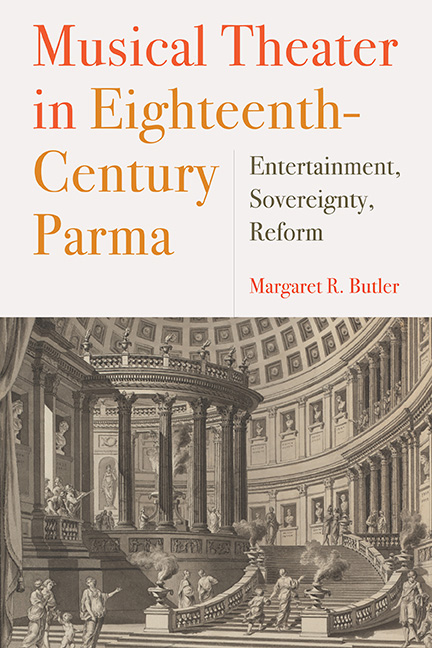Book contents
- Frontmatter
- Dedication
- Contents
- List of Illustrations
- Acknowledgments
- List of Abbreviations
- Notes to the Reader
- Introduction: The Genre Problem: Reform as Continuum and Brand
- 1 The Genesis of Parma's Projet
- 2 Behind the Scenes: Production and Management at the Teatro Ducale
- 3 The French Entertainments: Creation, Publicity, Propaganda
- 4 Moving On While Looking Back: Traetta's First Parma Operas
- 5 The End of the End of Reform: The Wedding, the French Ambassador's Opera, Traetta's Departure
- Conclusion: Reform Revisited
- Appendix: General Chronology
- Notes
- Bibliography
- Index
2 - Behind the Scenes: Production and Management at the Teatro Ducale
Published online by Cambridge University Press: 24 October 2019
- Frontmatter
- Dedication
- Contents
- List of Illustrations
- Acknowledgments
- List of Abbreviations
- Notes to the Reader
- Introduction: The Genre Problem: Reform as Continuum and Brand
- 1 The Genesis of Parma's Projet
- 2 Behind the Scenes: Production and Management at the Teatro Ducale
- 3 The French Entertainments: Creation, Publicity, Propaganda
- 4 Moving On While Looking Back: Traetta's First Parma Operas
- 5 The End of the End of Reform: The Wedding, the French Ambassador's Opera, Traetta's Departure
- Conclusion: Reform Revisited
- Appendix: General Chronology
- Notes
- Bibliography
- Index
Summary
The Teatro Ducale's well-organized system and the effective management of its many overlapping areas of activity facilitated Parma's complex entertainment offerings starting in the watershed year of 1755. This year Guillaume Du Tillot not only issued his public decree designed to reform audience behavior but also restructured the theatrical administration and revised the Teatro Ducale's management procedures. The total costs of the French troupe (lodging, in Colorno and Parma, maintenance, and stipends) and those for all the scenery and costumes for all of the Teatro Ducale's operas— French and Italian—were now borne by the royal house, which oversaw their design and production. Du Tillot limited the power of the impresarios he contracted from this year forward. Those men were to engage the principal singers for the Italian operas and front the costs associated with the gambling establishment, a prominent feature in Italy's principal theaters and a focal point of the Italian entertainment experience. The spectacular element of opera at Parma, now institutionalized, became significantly enhanced. Du Tillot's quality control over components tied to visual display clearly illustrates his priorities.
Du Tillot's decisive involvement in theatrical production was by no means limited to a larger restructuring, but involved the day-to-day operations of the theater as well. Perhaps no text sums up the immense logistical undertaking of coordinating the French troupe quite as well as his thirty-article decree in which he dictated the terms of the troupe's behavior, attendance at rehearsals and performances, and penalties for infractions. The document was printed up in one hundred copies, as a manuscript emendation at the top of the page shows. In addition to attempting large-scale crowd control, Du Tillot personally signed off on enormous quantities of receipts, summaries of expenses at various stages, and statements of arrangements; moreover, he penned a heretofore unexplored statement of the theater's production practices that is among the most revealing documents of its type currently extant. His hands-on style of management was one of the keys to the administration's ability to operate efficiently. This ability was particularly important for Parma, since both the French entertainments and Traetta's operas included elements foreign to most Italian theaters, and that in other places led to significant practical and logistical challenges.
- Type
- Chapter
- Information
- Musical Theater in Eighteenth-Century ParmaEntertainment, Sovereignty, Reform, pp. 36 - 52Publisher: Boydell & BrewerPrint publication year: 2019



